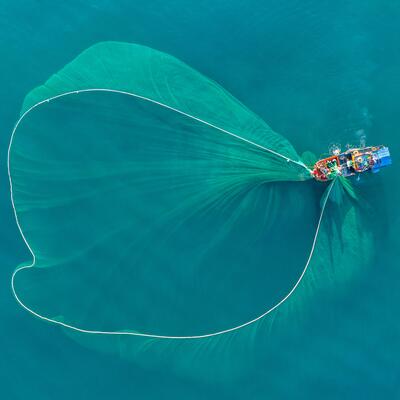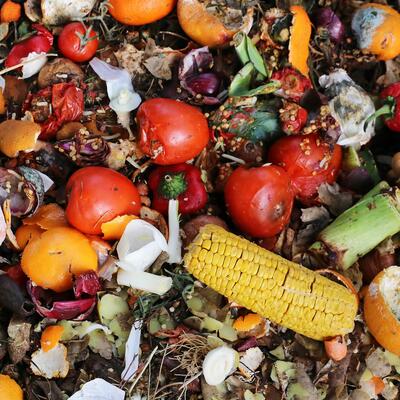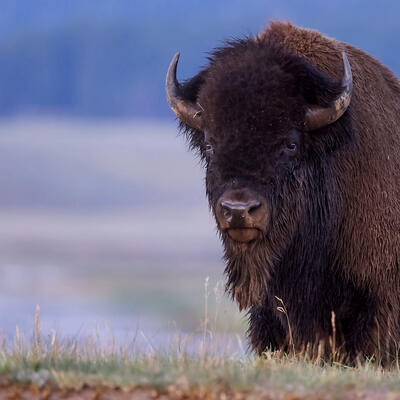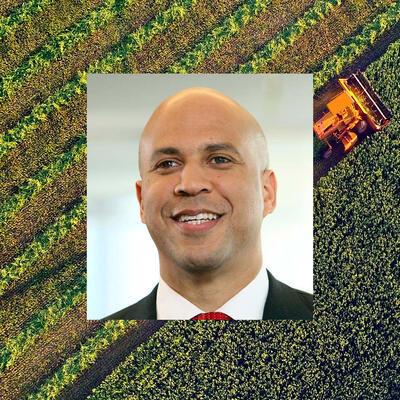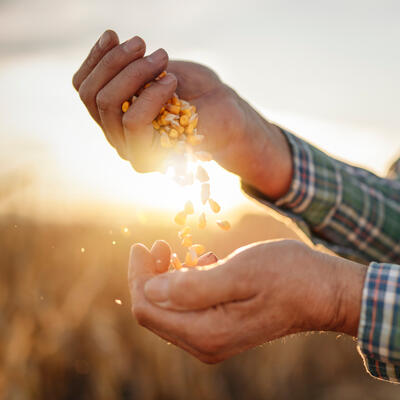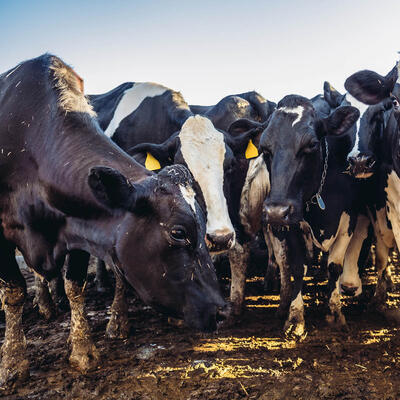
Billion Dollar Burger
Guests
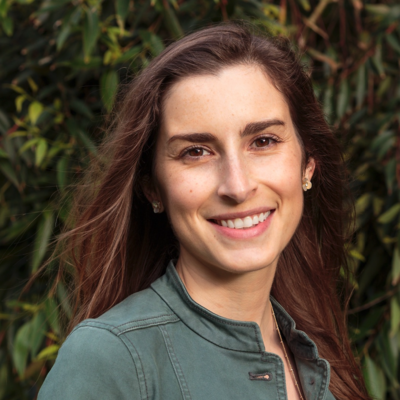
Sophie Egan
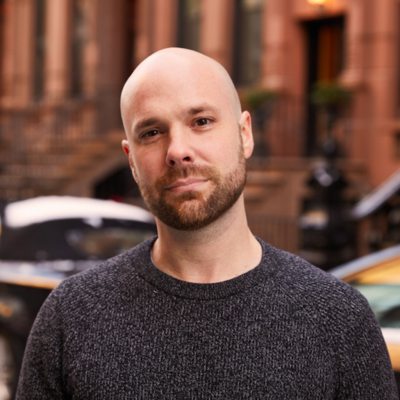
Chase Purdy
Summary
Long before the coronavirus began disrupting America’s trillion-dollar meat industry, climate-conscious eaters were looking for ways to reduce the amount of animal protein in their diets by choosing meat manufactured from plants or meat grown in a laboratory from cells of real animals.
“In order to reach optimal human and environmental health in the future, there is wide consensus that generally speaking all around the globe folks need to aim for a flexitarian diet,” says Sophie Egan, author of How to Be a Conscious Eater: Making Food Choices That Are Good for You, Others, and the Planet. “What that basically means is an emphasis on plant-based foods.”
But are lab-grown meats in fact less harmful to the environment than livestock meat?
“There are varying degrees of how much better it will be, but in every single case there's not much debate over the fact that it would be better,” says Chase Purdy, author of Billion Dollar Burger: Inside Big Tech’s Race for the Future of Food. That said, Purdy notes that few if any of the companies involved in cultured meat have produced life-cycle analyses of their products. As such he suggests approaching them with a certain healthy skepticism.
“Where are they getting their money? What does their process look like? What’s inside your liquid medium?” he asks, for example. “To tackle the 14.5% of the world's greenhouse gas emissions being tied to animal agriculture to not skeptically and thoughtfully consider the possibilities of how cultured meat could help us tackle those things I feel like that would be irresponsible.”
Additional Speaker:
Riana Lynn, CEO of Journey Foods
Related Links:
Beyond Meat
Impossible Foods
Journey Foods
Billion Dollar Burger: Inside Big Tech’s Race for the Future of Food
How to Be a Conscious Eater: Making Food Choices That Are Good for You, Others, and the Planet
This program was recorded via video on July 9, 2020.
Full Transcript
Greg Dalton: This is Climate One. I’m Greg Dalton. [pause] For climate-conscious eaters, the future of food means less animal protein.
Sophie Egan: In order to reach optimal human and environmental health in the future, there is wide consensus that all around the globe folks need to aim for a flexitarian diet.
Greg Dalton: Companies are creating meat-like products from animal or plant cells. And the wider food industry is taking notice.
Chase Purdy: I think the speed that people have adopted and shown interest in these products is reflected not just in the sales data but also how the meat companies talk about themselves.
Greg Dalton: But are high-tech innovations the right way to address more structural problems in our food system?
Sophie Egan: While no one should reasonably be expected to eat a thousand dollar, million dollar burger, so too should we really be questioning the concept of a dollar burger.
Greg Dalton: Billion Dollar Burger. Up next on Climate One.
---
Greg Dalton: Can we have our beef and eat it too by embracing high-tech, lab-grown meat? Climate One conversations feature energy companies and environmentalists, Republicans and Democrats, the exciting and the scary aspects of the climate challenge. I’m Greg Dalton.
Greg Dalton: What’s more American than a big meaty hamburger?
Chase Purdy: What you make isn’t meat, it’s a plant-based burger.
Greg Dalton: That’s freelance journalist Chase Purdy, recalling a conversation he had with the CEO of Impossible Foods -- one of a new generation of companies that are developing high-tech alternatives to animal protein made from plants. Chase’s new book is called Billion Dollar Burger: Inside Big Tech’s Race for the Future of Food.
Sophie Egan: They’re not targeting vegans and vegetarians, they’re targeting diehard carnivores. This bleeds in a way that you carnivore love meat to bleed.
Greg Dalton: Sophie Egan is author of How to Be a Conscious Eater: Making Food Choices That Are Good for You, Others, and the Planet. She formerly served as Director of Health and Sustainability Leadership at The Culinary Institute of America. She says the future of protein features two innovations that could reduce the climate impacts of our diet: meat manufactured from plants and meat grown in a laboratory from cells of real animals.
Sophie Egan: Yes, the future of protein I would argue is far more diversified or could be far more diversified than those two camps. We can certainly get to the many parallel pathways that are needed given the scale of the protein the need for the protein shift in terms of feeding the growing population in ways that really stay within planetary boundaries that is the carrying capacity of the earth. As far as how those camps are different I mean what’s interesting is some meat and certainly my colleague here, Chase, can speak to this in far more detail but is essentially saying the idea of slaughtering animals is crazy and yet people want to eat meat. So in the future let’s not have factory farms and let’s cultivate the meat from cells and thinking of these along the lines of breweries and lots of other foods we’re very accustomed especially in the U.S. with highly processed foods we’re highly accustomed to foods that come from laboratories. The plant-based meat folks are similarly creating kind of replications of what are commonly consumed as burgers and so on but, hundred percent from plant-based ingredients. So ingredients that are at some point in their origin they came from the ground. They might be soy or other kinds of plant proteins and then in the amalgamation often sort of mimic the traditional forms of meats that are more traditional hotdogs, burgers and the like.
Greg Dalton: Right. Yeah, all sorts of those things coming out now. Chase Purdy, let’s talk about the terms because and it’s something that’s new and disruptive. What terms take hold, you know, have a lot to do with the way new products or concepts are perceive. There’s clean meat, cultured meat, lab meat. Help us with the nomenclature here in this new area.
Chase Purdy: Right. Yeah, the term span the gamut and they get as weird as motherless and fatherless meat and as sort of clinical as in vitro meat. Yeah, this space has absolutely been arguing over and continues to argue over what it wants to call its product. They you know, not so long ago were really touting this sort of aphoristic clean meat which is meant to like evoke clean energy. But then the guy who brought this to the public side back in 2013 who is in the Netherlands basically said this doesn't work in Dutch it sounds like it’s being run to detergent. And so there’s a lot of debate over what you call this in the book I chose to go with cell cultured meat or cultured meat because that's sort of very scientifically straightforward, even if it doesn't sound the most appetizing and it gives people may be an idea of how it is created. I think that it is a really I mean these companies are definitely grappling over this, especially as regulators start thinking about and making decisions about how this will be labeled on food packaging for people so that it’s clear for consumers. So we'll see where it ends up but right now it looks like the USDA and FDA are currently in their documentation using cell cultured. So we'll see what happens.
Greg Dalton: When I heard clean meat it reminded me of -- I vividly remember reading Eric Schlosser's Fast Food Nation and talking about how many parts of, you know, I don’t know dozens of cows are in one hamburger and basically saying there’s cow manure in your hamburger, traces of it. And so I thought clean meat was sort of a jab at the traditional cattle beef because they’re saying hey there’s no poop in this it’s clean stuff. Tell us, Chase Purdy, how is it made. I mean clearly it’s growing fat tissue and muscle tissue equals real meat. But how is it made?
Chase Purdy: Right. Well, I mean you basically do need three things to make cell cultured meat on a simplified level. You need the animal which typically these technicians will go out and you can just do a pretty harmless biopsy on a cow or a chicken or a pig or what have you, collect cells they typically want stem cells. And once you have these cells in a lab they established cell lines so that they don't have to keep going back out to animals very often. Once you have an established cell line you can take sort of a handful of these cells and you stick them in what's called a nutrient dense liquid medium or a serum. Which if you want to think about how this works in our own bodies or in animal making sort of livestock bodies. Blood is what really is transporting lots and lots of nutrients throughout our systems feeding ourselves everything that they need. Blood is very rich in like protein and certain amino acids and all of these sort of things that allow cells it really makes them happy and allows them to sort of replicate over and over again. So scientists have been working to create essentially whether like plant-based or synthetic liquid mediums as best they can for those cells to sort of happily sit in and proliferate. And all of that happens inside what's called a bioreactor people in the industry are trying to get the term cultivator out there. Essentially, it's a big stainless steel tank that's very fancy and very technical, and the cells sort of sit inside it in the liquid and they do grow and the fat tissue and muscle tissue, and some cases these companies are growing connective tissue. And you put those things together and you do have meat.
Greg Dalton: What is the cost and when will it be available? When and where?
Chase Purdy: Right. So I’ll start to the second part first. I mean, I was talking to one of the CEOs just yesterday about, you know, if you have to list the top three places where regulations are getting close as to allowing this in the market. He said in order, number one, Singapore, absolutely. Number two, the U.S. it used to be Hong Kong but there's been so much unrest there now that it’s doubtful that Hong Kong regulators are gonna have a lot of time to devote bringing cultured meat into that market. And then at number three is most likely Israel. In terms of the costs that’s a story that I think is like really interesting because often when people talk about cell cultured meat the language they use kind of writes it off pretty quickly as being very far out in the future because of cost. But if you think about the fact that in 2013 when it was introduced to the world by Dr. Mark Post in London. It was about $1.2 million per pound extremely affordable I know. And like in a matter of seven years it has drop like precipitously. In 2017, one of the companies said they got it down to 9000 per pound. And a year after that, that same company told the Wall Street Journal it was down to $1000 per pound. Most recently, whenever I was out in San Francisco or talking to a few of them. They said they had like a $50 chicken nugget which is down to about $45 per chicken nugget. And a company in Israel that I've spoken to in the last you know, week or so they're aiming and say they’re very close to having and again this is kind of far out yes but by 2022 they’re on back to having about, meat, about $10 a pound. So it struck precipitously the price and that will only drop faster as these companies start building their new pilot production facilities which five of them are doing.
Greg Dalton: Sophie Egan.
Sophie Egan: Well, what I think would be interesting to observe is for so long meat has been artificially low in this country. And the ways that maximum efficiency the harm to the animals the surrounding ecosystem impacts of factory farming and as becoming ever more clear now but certainly Eric Schlosser and other authors revealed has really treated “essential slaughterhouse workers” as truly disposable bodies. And so there's a lot going on in food not only in the protein space more probably around the notion of true cost accounting. And it’s interesting to me because while no one should reasonably and there's affordability issues of course but no one should reasonably to be expected to eat a thousand dollar, million dollar burger so to should be really be questioning the contact of a dollar burger or of a dollar chicken nugget and the existing costs. And I think in general with protein shift that’s occurring in the many different sort of the pathways to more sustainable more nourishing protein alternatives may help to bring some of those true costs more into light as meat actually becomes more, meat in particular maybe come more of special occasion items. Dr. Walter Willett is one of the most cited scientists and he started to encourage Americans to think of meat like lobster, something you have maybe once a year. And that cost, you know, reflects the less frequent nature of it.
Greg Dalton: And other people talk about meat as a kind of a garnish, kind of a sideshow rather than the big hunk central show on the plate. The cost is coming down for lab meat cultured meat. Sophie Egan that reminds me what happened with the plant-based burgers because I remember when they basically followed a Tesla model to make something that's very elite, expensive. Impossible Foods came out in some very fancy restaurants in San Francisco and it has celebrity chefs, Traci Des Jardins and others. And now you can get a Beyond Burger, I went to Carl’s Jr. last night and got a Beyond Burger, right, in Central Washington. So now it’s a fast food chain. That happened quite dramatically and quickly. So is thinking about shifting protein thinking putting your sort of sociologist hat on, you have Masters in behavioral change. Think about, you know, how is this happening this sort of hitting the mainstream hitting middle of America this is not a move from just the coast in Boulder and Berkeley.
Sophie Egan: Yeah, it’s a great point. I think many folks are looking at plant-based alternatives just the pace of interest and increased sales. Not only again in Impossible Burgers, but you look at every category of the grocery store that’s been disrupted with plant-based alternatives, yogurts and milks. And there are similarly nomenclature wars about what can be called a milk, right. It has to be milk-like beverage or white liquid or something like these other names. I think in this case it’s actually not so much a behavior change story as it is a money story in the sense of they had incredible distribution very fast and then they had really quite a successful marketing campaign with all kinds of just showing up everywhere, right. And with all kinds of celebrities and influencers as you mentioned. So those elements absolutely help to create two key elements in behavior change, which is the built environment our choices available to you in the first place as opposed to having to go out of your way to find that choice. Are they available at -- and then culturally the social environment is it normal cool and aspirational to eat in those ways. And so you have those two aspects that just it made it almost impossible not to kind of give into that interest and the curiosity to go try it’s like why not go try it.
Chase Purdy: Yeah, I would add actually to that two things. One is, it was very interesting for me to just kind of watch like how did Beyond Meat and Impossible Foods take two different strategies to get to market and which one kind of ultimately won, you know, both doing pretty well. But, you know, Beyond Meat very notably like decided that they would tackle the retail space first. Impossible Food decided that it would sort of go and make splashy market to market entryways partnering with known restaurants and known chefs. And I think to your point Sophie like really driving up sort of like curiosity factor. And the cultured meat companies have absolutely taken note of that and that's the exact queue many of them are looking at taking as the Impossible route which I think will sort of help introduce people to an idea that you know might be weird but might also make it precarious not to try it. And I think the speed that people have adopted and shown interest in these products is reflected not just in like sort of the sales data but also how the meat companies talk about themselves. It was, I think in March 2017, the former CEO of Tyson Tom Hayes appeared on Fox Business and very notably like explain how Tyson Foods was not a meat company, Tyson Foods is a protein company which is kind of like a massive shift I think from anything we've seen before. And he basically said people are interested in conventional animal protein people are interested in getting plant protein. Maybe someday they'll be interested in getting cell cultured protein. Either way, we can serve it up, which is just like an astonishing move.
---
Greg Dalton: You’re listening to a Climate One conversation about the future of protein. Coming up, can cutting-edge food technology address structural issues beyond what we eat?
Sophie Egan: Food is connected to everything. And so often the structural racism that occurs in the food system it’s like the hub of a wheel and all the spokes go to all of the other elements of society in which structural racism is also pervasive.
Greg Dalton: That’s up next, when Climate One continues.
---
Greg Dalton: This is Climate One. I’m Greg Dalton, and we’re talking about new kinds of meat from plants and the cells of real animals. My guests are Sophie Egan, author of How to Be a Conscious Eater: Making Food Choices That Are Good for You, Others, and the Planet. And Chase Purdy, author of Billion Dollar Burger: Inside Big Tech’s Race for the Future of Food. So are lab-grown meats less harmful to the environment than livestock meat?
Chase Purdy: The short and blunt answer to that is we don't know, because none of these companies have actually produced lifecycle analyses to what their actual production process looks like. And, so at this point we can only infer from the academic work that’s been going on. And if you look basically across the academic work and the research that's been behind this. There are varying degrees of how much better it will be, but in every single case there's not much debate over the fact that it would be better. In terms of like emissions, in terms of water used certainly in terms of like overall land-use. And if you wanted to look at energy, I mean like you really do, I mean it depends on how you look at it, right. I mean how do you like are you measuring like all the energy it takes to actually plant and grow massive fields for grains. And the energy it takes to shift those grains to animals and the energy it takes to like maintain this animal, ship these animals, kill these animals slaughter these animals. I mean, it's not a very far lift looking at the research to serve and for I think that it will be better. But simply we don't have the raw data we don't know yet.
Greg Dalton: You know, lot of the Amazon has been cut down to grow soy to feed the cattle. Sophie Egan, what do we know about the lifecycle analyses or the climate impacts of these plant-based alternatives are they really better? And some of them are really driven by some people who want to put meat out of business and say it’s better than cows. Do we really know?
Sophie Egan: Great. Well you know, so what we do know is that the raw ingredients of plant-based foods, plant-based protein into particular are generally speaking far less resource intensive. So it’s 20 times the greenhouse gas foot print of a burger compared to lentils or legumes water footprint is similar, land use is similar in terms of these ratios. The other big factor that you have is Chase was alluding to this is what’s called conversion ratio. This is just for feed ratios as well. How much feed inputs does it take to turn an animal into human food? And that’s where the bulk of a lot of the environmental and foot prints come from is just the fact that you have to raise an animal over time and feed it multiple times a day. And then of course yes, there’s emissions from burps it’s from really the burps not the farts of cows, but there is methane from the manure of cows. And so in terms of, you know, what’s in an Impossible Burger or what’s in a Beyond Burger. It’s very important to sort of just take a step back and say that generally speaking plant proteins, no question a huge, huge win environmentally versus in particular red meat of ruminant meat. So those are animals that have a rumen like a cow and lamb and goat primarily in the U.S. So that’s said, what’s tricky with Impossible and Beyond is that they’ve really and others they really are rather confusing in terms of the ingredient list. If you look at them they have many ingredients. And it’s always an interesting sort of dichotomy to me. I mean my first book was all about the American Food Psyche and how Americans and eaters in general are full of contradictions. One of them is that there’s been this general increase in eating in clean labels in eating more whole minimally processed foods. And you have the same folks who are looking for that purist label who are eating Impossible and Beyond which is like all kinds of butylated hydrolyzed, you know, multisyllabic ingredients that are not sitting in your pantry and how you kind of think well those are kind of incongruous. But when you really dig into it, it is basically like pea protein they’ve -- Impossible has reformulated so I haven’t actually recently look at the full list but it’s largely, you know, it’s proteins extracted or kind of derived from a soy or a legume based protein. And now the reason that there’s some question about this is that has to do with that at scale if now everyone’s eating Impossible and Beyond in such enormous quantities does this now incentivize monocropping of those raw ingredients that have, you know, equally or at least also hazardous impacts on soil health and on land-use and so forth. So generally speaking, the environmental argument is pretty solid for the plant-based alternatives where it’s not so solid is on the human health side. If you actually compare the nutritional profile of a regular whopper with an Impossible whopper, it’s almost identical. The first iteration of Impossible was actually far worse in terms of saturated fat, for example. So the point is we can have there’s a common health halo that comes with all kinds of foods that have attributes like organic or natural or if they are genuinely better in some other area like cage free or an animal welfare or a sustainability attribute. But we can't just assume that they’re also better for us nutritionally.
Greg Dalton: And there’s also heme, which is the blood. People like that juicy sort of flavor experience that comes from eating a real burger and heme is a GMO ingredient that we don't know the long-term health consequences, Sophie, of what humans eating that.
Sophie Egan: That’s great. And that’s the case in both of these areas is that it's very important I think to have a little bit of a cautionary approach. I mean one of the things that’s weird with the U.S. overall is we have basically the -- we don’t have the precautionary principle which in many other countries, you know, some folks say it inhibits innovation but it does also in the U.S. what it means is we throw stuff into the food supply and say we hope it doesn’t kill you more or less, I mean I’m exaggerating their food safety requirements. Bu in terms of the long-term consequences a very strong example of this is trans fat, right, partially hydrogenated oils. Only after many, many, many years and human, you know, basically American consumers as the guinea pigs did the FDA come out and say actually that’s not generally recognized as safe. And so then it had to go through this whole process of all these companies reformulating and pulling back products and so on and phasing it out. The reason I bring that up is because that it is important to realize before sort of jumping on any of these bandwagons that there are not yet generations of data to see how they behave in the body. Whereas we do have generations of data of seeing how those more traditional foods chickpeas and beans and legumes and whole grains and all these other kinds of more minimally processed more traditional foods actually can contribute they can be protective in terms of contributing to longevity. So Chase I don’t know if you got something in terms of the cell meat but I think that is a very important aspect is just to recognize that some of these things could take years to show effects in the body.
Chase Purdy: Yeah, I think that that's a really important point and kind of also just, you know, underscores the real -- I mean whenever I talk about cell cultured meat one of the questions that always pops up is how are we gonna know the long-term effects. And I did talk to, you know, the CEO of JUST, Josh Tetrick and sort of posed this question like how are you going to communicate the nutritional information around your products or you basically just going to ask people to implicitly trust that if they eat this over a long period of time they're going to be fine. And it's a complicated answer. And you know, Josh brought up Coca-Cola. One of the things about Coca-Cola as opaque as it is, is it has this sort of mystery factor like they are covering up certain flavors with other flavors they had a secret recipe that's like in a vault somewhere in Georgia no one knows what it is and that absolutely is something that will never ever, ever work for his industry he says. He says basically at some point in time as this stuff gets closer to market like they are going to have to invite the everyday person to sort of be able to see these facilities that this meat is growing in. They're going to have to be able to orchestrate people walking into these actual big bioreactor tanks let them see exactly where things are happening. To some extent that’s still like trimmings and trappings and not giving you, you know, I don't think I would even though I know the space better than the average person I don't think I don’t have the scientific knowledge to know what's happening in my food. But yeah there is like a certain opacity I don't know if we'll get over especially in the U.S. where you know in terms of the FDA and the USDA getting a product on to the market doesn’t even require like a legalized process. It's just sort of like a sort of stamp of approval that companies really want to have so that they don't get in trouble down the line.
Greg Dalton: We’re talking about the future of protein at Climate One with Chase Purdy, author of Billion Dollar Burger: Inside Big Tech’s Race for the Future of Food. He’s also a freelance journalist. And Sophie Egan author of How to Be a Conscious Eater: Making Food Choices That Are Good for You, Others, and the Planet. She formally worked for the Culinary Institute of America. Riana Lynn is an entrepreneur and former venture investor in the food tech space. Biologist by training she founded a couple of food startups and interned at Michelle Obama's kitchen garden. She's now CEO of Journey Foods a software company that helps food businesses source healthy ingredients. We asked her to peek behind the glossy image of companies promising new kinds of food.
[Start Playback]
Riana Lynn: The Impossible Foods and Beyond Burgers these alternative chicken nugget companies they are largely venture funded they spent a lot of money on influencers and going after sort of the elite or more yappy crowds at least in their marketing campaigns. But if you pull the cover back you also see that there are Black owned businesses and restaurants leaders that have been selling plant-based foods through our communities like Brooklyn and Chicago and Oakland and Atlanta for years. And now they are able to buy direct to buy from these burger companies and alternative product companies that they can put directly into their restaurants and directly into their catering. And so there’s been very exciting growth obviously on the retail side as people stock up their pantries and their refrigerators spending more for dairy and meat alternatives. And it’s across cohorts across socio economic lines across ethnicities. At the same time if you look at the venture capital side a lot of the company that are well funded that are getting tens of millions of dollars in creating the future of food don’t necessarily have investors or team members that are as diverse as the United States. Are our food companies and our research companies hiring from historically black colleges and universities are they hiring immigrants are they hiring people that come from the middle of Arkansas. Black women that are starting food companies are giving equal access on the retail level are raising this much funds for their ideas. Food tech is generally seen as altruistic, you know, we like create beautiful websites and we tell people that we’re gonna save ton of greenhouse gas or we’re gonna solve like indigestion with natural prebiotics. It runs the gamut of like things mission driven statement and solutions. A lot of people trust food tech leaders and food visionaries and we really can't be scared to sort of challenge these systems.
[End Playback]
Greg Dalton: That was Riana Lynn CEO of Journey Foods speaking about the funding behind food companies that focus on elite customers the altruistic motivations in food tech companies their hiring practices and challenging food systems. Sophie Egan, what structural racism do you see in the food industry?
Sophie Egan: Oh wow where do I start. I mean,a very clear visually evident example has come forward in COVID and that is the hands that feed us. Who are the “essential workers” mentioned slaughterhouse workers but it’s not only that. It’s delivery workers it’s the folks that’s called in the restaurant industry it’s back of the house. Often you see visibly different faces in a restaurant in the front of the house versus the back of the house. A fantastic book by Saru Jayaraman, Behind the Kitchen Door that looked at the incredible wage differences in restaurants and food service between largely white waiters and servers and almost exclusively workers of color doing the dishwashing and the cooking in the back of the house. Food in so many ways is just, food is connected to everything. And so often the structural racism that occurs in the food system it’s like the hub of a wheel and all the spokes go to all of the other elements of society in which structural racism is also pervasive. So we see this in housing but education, wages and so forth and just so on in so many dimensions. There’s a lot of data that’s come forward around this also related to the environment and climate we can get into that. But it’s something that it doesn’t surprise me that the conversations occurring right now around racism have come about at the same time that so many of the flaws in food system at large have come forward. The many ways in which normal was a crisis for many, many people. And it took these awful recent months to shed a huge light on that but in the ways in which the food system those who are these incredibly essential hands that feed us are not valued in the ways that they need to be. And that goes also to what I was mentioning before around true cost accounting. And so it’s everything from wages to housing for our migrant farm workers and so forth. There’s a couple things in the video though I don’t know if you wanna come back to that.
Greg Dalton: Let me ask Chase Purdy. There’s a narrative an image you mentioned to a vegan to most people. They might think of, you know, kind of a relatively earthy white person. But there's another narrative there of vegans that is often overlooked in and pushed aside in the media. Tell us about African-American black vegans that a story that just doesn't get told as much.
Chase Purdy: Yeah, I think the true American vegan story is never really told which is that I think black communities are often sort of the backburner of that. And what immediately comes to my mind is, you can look her up her name is Tracye McQuirter she’s in the DC area. And she conveys, I mean DC as just an example of this. Many, many, many of the first vegan restaurants across DC which has become like the super food city in a way. A lot of those early vegan places were started and run by black vegans. And the stories are never told and because of the way that gentrification reshapes these cities a lot of those places go out of business or no longer there and they’re forgotten. But the fact of the matter is, is that you know it is not necessarily that crunchy white person story that is actually the bedrock of the vegan moment in America. It’s very much not that.
Sophie Egan: Yeah. And actually the data has shown that the fastest growing vegan population in the U.S. is the black community. Polls have found that 8% being compared to about 3% and it is really exciting to me to see some organizations there’s a great one emerging called Urban Color another organization that I’m actually part of called the Food for Climate League is really recognizing that there’s this large demographic of eaters that’s just not being spoken to with a lot of the narratives and a lot of the marketing that do only aim for the Wholefoods crowd or the white sort of whatever caricature of a vegan or just a climate conscious eater. Another really important statistic is that thankfully gotten some more attention recently is that by and large people of color are far more concerned about the climate crisis. And they’re far more likely to say, they’re far more willing to contribute to campaigns to pressure politicians to do something about climate change. And so again that is a really important piece of the conversation going forward because of how powerful a lever food is as a tool for climate action. And so these eaters kind of waiting in the margins to be activated it’s just an enormous oversight among climate activists among food companies peddling plant-based foods. And I’m excited about organizations that are really recognizing ways to bridge that gap and truly democratize sustainable eating.
Greg Dalton: We’re talking at Climate One with Chase Purdy and Sophie Egan. I’d like to go to our lightning round and ask each of you. First a true or false question. One word, true or false starting with Chase Purdy. True or false, more people have gone into outer space than have tried lab meat?
Chase Purdy: True.
Greg Dalton: Sophie Egan. The best way to get venture funding from white guys from Stanford is to be a white entrepreneur from Stanford or another elite university?
Sophie Egan: True, true, true, true, true, true. And side note, everyone loves to read the book Brotopia which dives into that in great detail.
Greg Dalton: Chase Purdy. True or false, Impossible Burger and Beyond Burgers are highly processed and industrialized food?
Chase Purdy: Very true.
Greg Dalton: Sophie Egan, those burgers would pass the Michael Pollan test of don't eat anything with ingredients you can't pronounce or your grandmother wouldn't recognize as food?
Sophie Egan: False. They would not pass Michael Pollan’s test.
Greg Dalton: Sophie Egan. True or false, you’ve eaten a plant-based burger in the last couple of months?
Sophie Egan: False.
Greg Dalton: Chase Purdy, you’ve eaten a plant-based burger in the past couple of months?
Chase Purdy: True.
Greg Dalton: I ate one last night. Sophie Egan. True or false, a vegan diet is always a healthy diet?
Sophie Egan: Definitely not true. False. There are many different ways to eat a very crummy vegan diet.
Greg Dalton: True or false. Chase Purdy, cultured meat is hubris?
Chase Purdy: Depends on who’s making it.
Greg Dalton: The making of it is hubris.
Chase Purdy: To an extent, yes, true.
Greg Dalton: I’m gonna mention person, place or thing and ask you to say the first thing that pops into your mind unfiltered with reckless abandon. Sophie Egan, what comes to mind when I say almonds?
Sophie Egan: Crunch.
Greg Dalton: Often vilified. Chase Purdy, what comes to mind when I mention the public relations firm Edelman?
Chase Purdy: Dubious.
Greg Dalton: They did PR for the News Corporation when the hacking scandal in the UK Keystone Pipeline and others. Sophie Egan, what comes to mind when I say Frances Moore Lappe?
Sophie Egan: Diet for a Hot Planet. OG climatarian.
Greg Dalton: Chase Purdy what comes to mind when I say organic food?
Chase Purdy: Questions.
Greg Dalton: And last one for Sophie Egan. Amazon's purchase of Whole Foods.
Sophie Egan: Everywhere. It’s everywhere.
---
Greg Dalton: You're listening to a conversation about meatless burgers and other high-tech food. This is Climate One. Coming up, how to avoid over-glamorizing the companies and personalities involved in food innovation.
Chase Purdy: We should feel free to ask them as whatever questions we want to. Where are they getting their money? What does their process looks like? What is inside your liquid medium? We have to be thoughtful and skeptical about all of these companies.
Greg Dalton: That’s up next, when Climate One continues.
---
Greg Dalton: This is Climate One. I’m Greg Dalton. We’re talking about the future of protein with Sophie Egan, author of How to Be a Conscious Eater: Making Food Choices That Are Good for You, Others, and the Planet. And Chase Purdy, author of Billion Dollar Burger: Inside Big Tech’s Race for the Future of Food. With large traditional suppliers like Tyson and Cargill looking to manufacture their own meat, I asked Chase about the ranchers and others in the meat processing industry who could be cut out of the action.
Chase Purdy: Yeah, it’s a very real question. And luckily it’s one that is not going to be like someone switches a light switch on a wall and things change overnight. But the reality is if you ask sort of the scientists and CEOs who are in cell cultured meat companies. Some of them are far more candid than others and will say there is no long-term future for those people. And so over time they want to find work elsewhere. Some are that candid. I don't have a crystal ball and I can't look through the tea leaves but, you know, one thing that this also brings to mind is I do wonder how many jobs and how many local agricultural economies and communities were reshaped over the last 100 years whenever the meat system continue to consolidate and consolidate and consolidate. It’s not just you can’t think about this as to where we are right now and how things may change the food system in particular the meat system has been reshaping communities across America for, you know, the last century in a huge way.
Greg Dalton: And you've written about the huge consolidation. I’d like to ask Sophie about that profit margin because you've noted there's like $4 fruit wraps but you know, but people don't buy there’s not as much of a financial incentive as you said earlier in lentil. So we’re moving toward this food system that is driven by big-box and highly concentrated power.
Sophie Egan: Yeah, I mean the $4 fruit wrap example is to say that value added products are it’s a lot harder to drive sexy marketing and all of the same interesting and sort of appeal in just, you know, the bulk aisle or a whole bag of, you know, cowpeas or just whole apples versus the cartoon caricature adorned kind of fruit rollup. And that’s really where in general, processing is where companies make their money. And it’s also where they fundamentally strip out the most inherently good attributes of whole raw foods. The most prime example of this is whole grains. And this has occurred forever where there is actually one of the examples I’ve given is that the label non-GMO oats. The reason this is a scam is that they’re actually are no there’s not enough research funding among oat farmers to even do the research. Because people just don’t eat enough oats in the U.S. for them to have the kind of cash reserves to invest in that kind of a version of oats. And you look at all the many wheat or oat or other derived products right that sell like crazy. And what they do is remove the brand and the germ the most nutritious parts of a green kernel in order to turn it into a highly refined carbohydrate that has all kinds of health impacts in terms of blood sugar. And the other piece of this that is not often talked about is that’s all wasted food it’s the most essential nutrients. It’s literally a huge crime I think in terms of food in the environmental side of this. But absolutely that’s where the power comes from. And I think the part that really gets me about a lot of, you asked about hubris, it gets me a lot of these founders of cultured meat companies and plant-based companies. And this is maybe to your very first question of the conversation of what these camps have in common. They sell the idea that they have the single bullet that they are the solution to the protein crisis. What they agree on is that the status quo, factory farming does not work. And that at least is a good starting point but then instead of saying it’s going to take a whole suite or a whole toolbox of tools and we’re bringing forward one option that may work for some eaters. They get so much funding because they’re selling like the magic solution the be all end all. And they do describe things very much in binary terms like we will take the entire industrial market of raising livestock and shift it completely to what we are doing. And I just find that kind of thinking incredibly problematic because we’re talking about systems first of all and we’re talking about people who put food in their mouths and they do so for very different reasons. They have dietary restrictions they have medical constraints. They may have different palettes in cultural considerations different budgets. Then there's just the whole range to that people are not, people eat something different based on day parts, based on our moods. So there’s so much more nuance and gray area that gets completely left on the chopping block in these VC purchase and that’s the part that I find very troubling is the notion that there is a one solution. And then if we just funnel enough VC funds to it, you know, that problem solved.
Greg Dalton: And Sophie Egan a lot of this is really driven by a presumption of a need for protein. How much protein do people need and are we eating many people eating too much?
Sophie Egan: Oh my gosh, yes. I’m glad you asked about this. So there’s kind of this trio of sub myths that together make up what I call the great protein myth. And this is basically in the U.S. we think we need more protein than we do. We think we get less protein than we actually do and we think that meat that comes from animals or protein that comes from animals is superior. None of those things is true. In reality, Americans eat about twice the recommended amount of protein. North Americans eat about six times the recommended amount of red meat. And even on vegan or vegetarian diets could easily hit the kind of threshold for protein. And so actually this is again like the whole grain story I was telling. It’s also a huge food waste and natural resource issue when you come down to it. Because what happens is your body can’t do anything with that extra protein. It’s just waste in your system. And so all the resources that are going into all of the protein which happens to have, you know, animal proteins have the highest impact in terms of any of the foods. It’s a huge waste and it’s not doing our bodies any good. So there’s this anxiety about protein and a lot of it has to do I think with kind of years of eating carbohydrates and having the blood sugar crash when you just rely on food that have no protein. But we’ve flown so in the opposite direction that you’ve seen years of protein on labels of products like water and cereal where they really you know, you don't need to be worried about it. The other key part of this to go back to the notion that they’re really are not be the single magic bullet approach is that one of the many solutions forward is just to eat less protein. It’s not the which of the many solutions out there will kind of replace what we’re doing but actually just in total reducing the anxiety and realizing that through a mix of foods throughout the day, whole grains, vegetables, those contribute to your total protein intake so you don’t have to eat just like pure slabs of protein to get your daily intake. So I hope that that is at least seen as a piece of the puzzle too because it can go a long way. It’s waste of money, wasted calories and certainly wasted resources.
Greg Dalton: We have a question from Tammy on YouTube. “Will there be a place for using crickets or crickets flour in the future?”
Sophie Egan: Yes. In general, the protein shift that we mentioned is needed should include many different pathways. I believe that insects and other forms of animal, protein if you will will definitely play a role. Another thing that will play a role is just trading down within the animal kingdom. So if you replace just some of your pork or beef intake with poultry or eggs, that has a far lower carbon and water footprint. If you also look at sustainable protein from the sea, algae is going play a key role and seaweed. These things grow like crazy and very nutritious. Then of course we did mentione legumes but just in general what should be a key theme of the future of protein is greater diversity. Greater biodiversity overall and greater diversity of the types of protein that we consume. And when you get right down to it what we currently rely on is rather boring, right. There’s only so many ways to eat chicken.
Greg Dalton: Chase Purdy as we get close to the end I wanna come back to like sort of the glam of that's comes out of Silicon Valley. Food tech is very sexy and as I was reading your book you mentioned some famous billionaires some famous companies. I thought about asking about them then I thought well if I do that am I kind of falling into that narrative of kind of contributing to that sheen around these companies and kind of glamorizing what I think you end up fairly skeptical about the industrialization of where this is going and the concentration of power. I just like to end there and just talking about you get sort of philosophical at the end about what is food and our relation to it. And are we playing into someone's hands. As a journalist if we say oh this famous you know, VC or this billionaire is behind this company. That means it's cool and smart. Your reaction to that.
Chase Purdy: Yeah, I absolutely think that, you know, sure you can talk about how Bill Gates is interested in this how Li Ka-shing in Hong Kong has been putting money into this you can mention those names. At the end of the day, this sort of alternative meat products in some ways are like the granddaddy of processed foods. And I think that especially when you look at what has happened in the U.S in regards to health that can be tied to our diets. And we have every single reason to not trust and to ask every question that comes to our brains toward the companies that are making these types of foods for us. And, you know, my hope with this book is that it sort of gives people a little bit more of the language to ask those questions. I think that the potential upside to cell cultured meat for example, are so enormous. I mean to tackle the 14.5% of the world's greenhouse gas emissions being tied to animal agriculture to not skeptically and thoughtfully consider the possibilities of how cultured meat could help us tackle those things I feel like that would be irresponsible. But they absolutely should not be given a free pass. We should demand transparency from these companies and we should feel free to ask them as whatever questions we want to. Where they’re getting their money? How they're making their -- what their process looks like? What is inside your liquid medium? How do we like, I mean we have to be thoughtful and skeptical about all of these companies especially when they speak about themselves in such aphoristic terms. You can’t trust anything and I think you should ask everything.
Greg Dalton: And Sophie Egan, a lot of them are using climate as a sales tool. We are the climate saviors because cows are bad and food tech will save us.
Sophie Egan: Right. And I mean, I certainly echo everything that Chase said. I offer in my book How to Be a Conscious Eater, a more holistic way of evaluating food choices that says yes is it good for the planet but also is it good for you and is it good for others. And having that more holistic set of apertures through which to view your food choices, will help you know which questions to ask so that you don't get sort of tunnel vision and so myopically focus on the one attribute that they’re leading with. And this is a playbook that come from a wide history in terms of health and nutrition being the key. Same as I said there’s many ways to eat a crummy vegan diet just because something is plant-based doesn’t mean it’s good for you. Doesn’t mean it’s good for others and the workers and so forth. So it definitely having that kind of mental checklist over time can be conserve as a sort of buckets to find the factors or to identify the factors that you wanna be on the lookout for. And it may very well be that they’re hitting the nail on the head in one of those dimensions. But hold them accountable ask those questions to find out about the rest. And to really probe into what’s behind whichever nail they’re reporting to be hitting the head on.
Greg Dalton: So Sophie Egan, your book got positive reviews for kind of giving people simple takeaways from what are very complex choices. So for someone who wants to take care of their own health and health of the planet, what are some top takeaways to guide their dietary choices?
Sophie Egan: Yes. So we’ve touched on a couple of them. But basically the main points would be in general a plant rich or flexitarian way of eating for the long haul not a diet for the short term. But emphasizing food that come from the ground will get you a really long way kind of major bang for your buck in terms of optimizing your own health and that of the planet and others. A second big one is whatever you can do to minimize food waste. It goes an incredibly long way and of the food that you waste the number one thing not to waste is red meat because of how incredibly resource intensive it is. Last main takeaway I would say is look for ways to have your food choices contribute to soil health. Soil is extraordinarily precious. All of our food supply relies on it. And so whether it’s organic, regenerative or just direct to consumer conversation you’re having with at risk growing your food. Everything that we can do to ensure that we have our most vital resource of healthy soil is going to not only be good for the planet but it’s also going to grow food that’s more nutritious and that happens to be more delicious.
Greg Dalton: Some of the biggest optimists I meet in climate circles are the soil people. Soil is sexy and trendy these days it’s very hot. Chase Purdy, your thoughts on it. I’ve been thinking here thinking like well given the huge concentration of wealth and power pushing us in a certain direction. Is the slow movement going local buying local are we deluding ourselves can that really make a dent when there’s such powerful forces driving us in this kind of industrial way?
Chase Purdy: That’s a difficult thing to answer because I absolutely love sort of the vision that’s put forward by like Michael Pollan and Alice Waters. And I think that a lot of sort of that slow food movement relies and so that local agricultural economy developing that. Unfortunately I think that if we didn't have climate change to contend with I think that we could absolutely be pushing more in that direction. But that movement has been around for a long time and it hasn't made the strides that it needs to make in order to capture enough interest and enough people. And honestly it also is very difficult when you look at how to implement the slow food movement’s best things across all socioeconomic brackets. And so for that matter as much as like I love the principles of it. I do think that like you have to consider some of the propositions that food technologists and cell cultured meat people and plant-based meat people are putting before us.
Greg Dalton: Could COVID push things more toward -- COVID is causing the rethinking of long global supply chains and having things that are essential closer to where they're needed. Could COVID push things in a more of a way from centralization towards more local?
Chase Purdy: It depends on how if you’re talking about cell cultured meat it really kind of depends on which company you’re talking to. This isn’t a bad that’s actually starting to bubble up in the space right now. Do you have sort of this like distributed model where you know, there's a cell cultured meat facility outside of Chicago that services that area or do you put one and smacked out in the middle of Nebraska and it's huge and it services like most of the states. Some companies would say that’s where they’re leaning that's what JUST is leaning towards doing. But there are other companies that aren’t very receptive to that idea. One is like Finless Foods in San Francisco around the Bay Area they're making cell cultured fish. And one of the things that their CEO Mike Selden brought up to me was there's really no difference whether you like catch a fish or you’re growing fish cells and making fish meat. Once you have like your fish in hand, the sooner you eat it the better it's going to taste and be. And so it doesn't really make sense in the case of fish for instance to like have one giant plant that’s in the middle of the country. It is better to have them be more local. It is a debate that’s in this space and I hope that it gets more play because it deserves more play. And I think they would probably be especially because of the weaknesses that we've seen come about the weaknesses that have always exist but weaknesses that COVID has exacerbated and shown us. I feel like a more spread out model might be more expensive but smarter model in the long run.
Greg Dalton: Sophie your last thought on whether COVID is sort of a wildcard in redirecting the food system.
Sophie Egan: I do think so. I think more regionalized food systems plural and also just a greater understanding of food sheds because of the ability to be more nimble more adaptive more responsive in real time. I also think, I don’t think it’s either or. I think it’ll be in parallel with these national and continued multinational types of supply chains. But you will just have all of this happening in confluence. In addition even a more micro level I think there’ll be more food sovereignty. I really do think you’ll have more folks growing their own foods. And in general, what will I believe characterize all of these food relationships is trust and transparency. We’ve talked about that but the more direct to consumer routes the fewer sort of steps in between. Whether that's geographic or just in terms to the number of players I think will really more direct to consumer more relationship driven kinds of eating in your own backyard in your own neighborhood and region and all around the globe.
---
Greg Dalton: We’ve been talking about high-tech alternatives to animal protein with Chase Purdy, author of Billion Dollar Burger: Inside Big Tech’s Race for the Future of Food. And Sophie Egan, author of How to Be a Conscious Eater: Making Food Choices That Are Good for You, Others, and the Planet.
Greg Dalton: To hear more Climate One conversations, subscribe to our podcast on Apple Podcasts, Spotify or wherever you get your pods. Please help us get people talking more about climate by giving us a rating or review. It really does help advance the climate conversation.
Greg Dalton: I recorded this conversation at the studios of Spokane Public Radio and would like to thank Brian Lindsey and Jerry Olson for their hospitality while I was on a road trip. Kelli Pennington directs our audience engagement. Tyler Reed is our producer. Sara-Katherine Coxon is the strategy and content manager. Steve Fox is director of advancement. Devon Strolovitch edited the program. Our audio team is Mark Kirchner, Arnav Gupta, and Andrew Stelzer. Dr. Gloria Duffy is CEO of The Commonwealth Club of California, where our program originates. [pause] I’m Greg Dalton.

